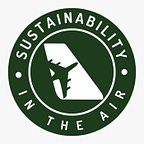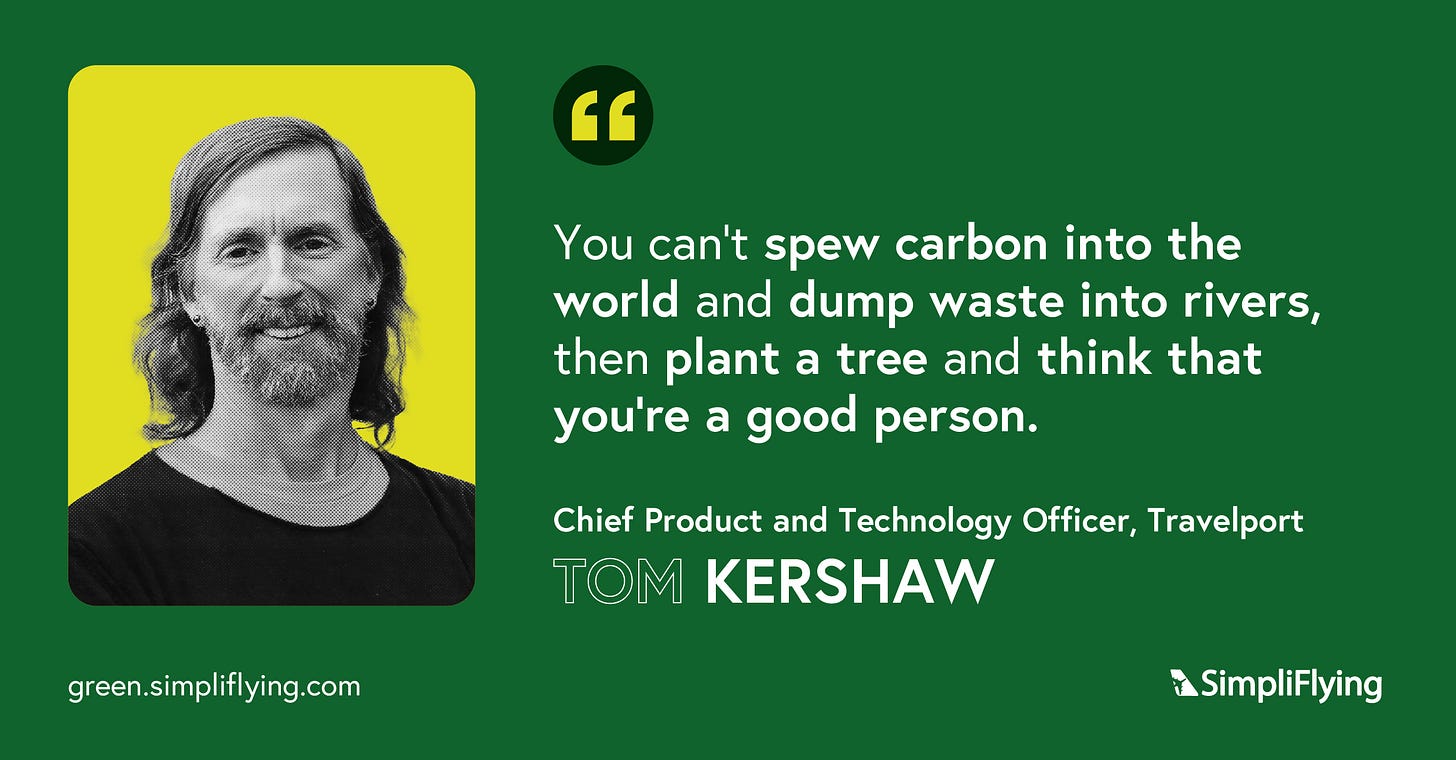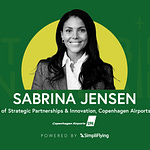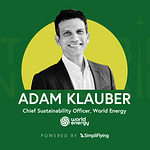In this episode of our ‘Sustainability in the Air’ podcast, Tom Kershaw, Chief Product & Technology Officer at Travelport, speaks with SimpliFlying CEO Shashank Nigam about how technology coupled with a transparent, collaborative approach can lead to a sustainable future.
Travelport is a travel technology company with transparency at its core. It provides “a single, independent marketplace for buyers and sellers of travel” that helps travellers make informed travel decisions while enabling travel businesses such as airlines and hotels to personalise their content and offers.
Here are the key highlights of the conversation:
Does planting trees really help? (5:08)
The role of sustainability in an organisation (8:44)
The importance of transparency and open source (12:14)
The chasm between consumer sentiment and action (22:17)
What impact can corporate travel have? (28:30)
What role should governments play? (35:17)
Rapid Fire! (41:14)
Keep reading for a quick overview of the episode.
Why a proactive approach to sustainability matters
Kershaw asserts that sustainability is a technical problem that requires integration and collaboration across various departments.
He advises against getting enamoured by easy solutions, such as planting trees that make us feel good about ourselves while ignoring the damage being dealt to the planet. While reforestation is undoubtedly beneficial, some current offsetting methods risk becoming superficial solutions that feel like "get out of jail" cards. It's imperative to ensure that such actions don't serve merely as excuses or the sole remedy to global warming or overall sustainability.
Instead, we should focus on responsible daily activities and choices. Truly addressing environmental challenges requires a proactive approach, emphasising preventing harm rather than only offsetting it. Furthermore, increasingly accepted solutions such as electric cars and wind power prove that sustainability can become achievable over time with widespread adoption and investment.
The journey towards zero emissions in travel is ambitious but attainable with collective dedication, innovation, and collaboration. The core message is clear: prevention is preferable to a mere offset, and the future of sustainability hinges on innovation and unified commitment.
5 key questions in sustainability
1. Which part of an organisation should house sustainability efforts?
Kershaw begins by emphasising the importance of holistic sustainability in the travel industry, underscoring that it's not just an isolated issue for Chief Sustainability Officers but requires integration across all facets of an organisation. He believes true sustainability advances will occur when every department focuses on the sustainability agenda, from revenue to HR to technology.
He highlights that Travelport, a software company for travel stakeholders, embeds sustainability in their culture and approach. Their objective is to make the travel industry think about the environmental impacts of each decision, aiming to inform consumers about the carbon emissions of flights they choose.
However, Kershaw also acknowledges the complexity of such an endeavour, given the absence of standard measurements for carbon emissions and the challenge of translating technical data into understandable information for consumers.
2. Does carbon emissions data have to be 100% accurate?
Kershaw recounts that while he initially perceived the issue of sustainability in travel as straightforward, he quickly realised the inherent complexity of various aspects.
For example, informing consumers about the environmental impact of their travel choices, such as the carbon footprint of different flight options, is challenging because there isn't a standardised method for calculating emissions, especially when predicting the impact long before the flight takes place.
Furthermore, he underscores the difficulty in conveying what specific carbon values – say, 32 pounds or some other number – mean to consumers. Ultimately, the aim is to get consumers to consider the environmental consequences of all their activities and choices. Despite the perception that informing would be a simple task, it’s extraordinarily difficult.
Moreover, Kershaw has a unique stance on carbon emission predictions – he emphasises the importance of transparency over accuracy. He argues that being exact isn't as crucial as having a standard method everyone can understand. Initially unpopular a few years ago, this position has gained traction in the industry.
Kershaw’s commitment to transparency led Travelport to join the Travalyst Coalition, valuing its open methodology that everyone can access, utilise and comprehend.
“I don’t necessarily care about accuracy. I care about transparency. It's important that we know, in relative terms, which flight is better for the environment and which has the least carbon emission. It doesn't have to be 100% accurate.”
3. What’s the best methodology for carbon calculations?
Kershaw strongly advocates for open-source methods for travel calculations, emphasising that this is not an area to be weaponised against competitors.
He calls for a universal approach, aiming to avoid petty debates over insignificant differences. His commitment to Travalyst was driven by its open-source principles and the transparency it provides.
While acknowledging its complexities, especially with increased participation, Kershaw appreciates the collaborative nature of open source. Despite the challenges, he views open source as non-negotiable.
Kershaw points to the growth and influence of Travalyst, given its diverse membership, which ranges from tech giants like Google to various travel agencies. He contrasts this with IATA’s proprietary, non-transparent method, reinforcing his belief in the transparency, documentation, and collaboration of open source.
“When I have all these folks knocking on my door, trying to sell me their super accurate product, I ask, ‘Well, how do you calculate that?’ And if they say ‘That's my intellectual property’, I say ‘I don't need to talk to you’. Because I want an open-source standard that's fully transparent that tells me exactly how it's calculated.”
4. How can we nudge business travellers to make better decisions?
Kershaw emphasises the importance of integrating sustainability into travel choices. Currently, every search result on their platform displays the expected carbon emissions using open-source tools. Additionally, rail integration is now available to offer more eco-friendly options.
Kershaw highlights a significant upcoming feature: controls that will allow travel agencies or corporate travel managers to prioritise lower emissions flights. This is crucial since corporate travel has more potential to impact industry trends.
However, Kershaw points out a gap between consumer claims and actual behaviour. While many say they prioritise sustainability, most often choose convenience and cost. Initial efforts to highlight sustainable options yielded about 4% uptake, which has remained steady.
Read more about this consumer behaviour gap in our report:
Kershaw believes corporate travel managers, driven by ESG goals, can influence more significant change. They can set emission limits or departmental travel budgets based on carbon emissions. Tools that empower such managers can transition the industry from minor sustainable travel choices to more significant ones.
“If a corporate travel manager decides to set an emissions limit, they might establish a budget for the marketing department, allotting them X tonnes per year. If they exceed that limit, further travel for the department will be halted. So putting those tools in the hands of travel managers, I think, is where the impact will go from a small number to a large number.”
5. What is the role of government and regulation?
Government intervention and grassroots initiatives have a crucial role in promoting sustainability. Kershaw suggests that real change often starts from the grassroots, and by the time governments respond to environmental concerns, it's a late intervention.
However, it’s worth noting that governments can play a crucial role where there are significant investment challenges. For example, for sustainable aviation fuels (SAF) to become commercially viable, long-term investment is required. This might be beyond the scope of individual companies, hence the need for government support. For example, in Europe and California, governmental mandates and policies have encouraged investments in SAF startups and its purchase by airlines. California, driven by the Inflation Reduction Act, is a major hub for SAF.
A hotly contested point is whether these governmental actions are proactive leadership moves or reactions to pressure from informed citizens. While the role of governments is clear, grassroots movements and passionate individuals also make a significant difference.
Globally, there’s an uneven adoption of sustainable practices. Europe and North America have progressed due to governmental incentives. In contrast, regions like India and Australia are behind, indicating a lack of similar incentives.
Overall, meaningful change requires a collective effort. Be it government action, grassroots movements, corporate endeavours, or informative platforms, all play a part in the journey towards sustainability.
“I don’t want to credit or blame governments; they are vital players in this ecosystem. It doesn't matter who initiated the change. Both citizens and governments are involved. It requires government action, citizen participation, company involvement, staying informed, and platforms like this podcast. Everything contributes, and removing any component makes the task harder for all.”
‘Sustainability in the Air’ is the world’s leading podcast dedicated to sustainable aviation. Through in-depth conversations with top aviation leaders, we break through the clutter and provide a clear roadmap for a net-zero future.
This episode of the podcast is brought to you by Travelport, a global technology leader that powers bookings for travel suppliers worldwide. Their travel retailing marketplace, Travelport+, empowers travel retailers to understand and communicate the most sustainable travel options.















